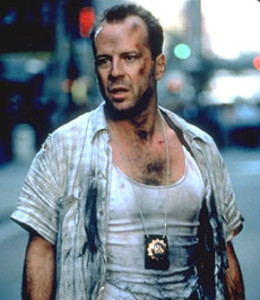Poor Matt is in trouble and it’s already day 9. Catch you guys on the flip side of this critique entry with comments. And I hope you will join in the discussion to share your insights for the author of SKIN-DEEP MOTIVES.
Day 9
Matt Grudge
As my vision focused out of unconsciousness, I felt in my aching bones that my life’s work as an investigator and the murder of a tattoo artist were worth more than the taste of copper pennies in my mouth. My abductors must’ve believed it too, because they ripped the duct tape from my cracked, bleeding lips so I’d be able to speak. The warm mouthful of blood dribbled down my chin to spatter the concrete floor beneath my naked, suspended feet.
My wrists were bound in the cold stainless steel of a pair of handcuffs, while the burning throb in my taut biceps and pulled shoulders indicated my captors had hung me from a ceiling. The blinding light from a hand held florescent beam struck me square in the face and lingered long enough for its heat to singe my scruffy, nine-day growth of whiskers.
Metallic clicks and clangs echoed all around, and a steady leak dripped; it could’ve been water or my blood. Labored breaths came out through the nostrils of my broken nose in a wheeze. I re-opened my left eye slowly to discern images in the wall of white, my right too swollen shut from being beaten to operate. A cloud of flies buzzed around, reveling in the perspiration of my body that set off an indigenous stench of manure.
Two gray shadows materialized in the light. They seemed extraterrestrial to me in that I couldn’t tell what sex they were. The chemicals I’d somehow been slipped back at the nightclub had such a bending effect on my senses, the two people constantly morphed between being one person, sometimes three. The knockout drug also screwed with the pitches of their voices.
“You’re on your own now. That Pocahontas bitch you run with is gone. Time to pay your dues, punk.”
I began to karaoke a verse of “Come As You Are.”
Comments:
Under the guise of being in the head of Matt, the author also is in omniscient POV to give every detail of Matt’s situation like an out-of-body experience, right down to his drops of blood hitting the floor UNDER him. With Matt suffering extensive beatings and just coming to, he might not even know his name much less see everything around him with such clarity. An author has to see through the eyes of the character only that which the character would truly see, or feel or know.
NINE DAYS hanging by handcuffs? With no food or water…suspended? With this being the start of the novel, I don’t see a need to have the 9 Days tagline. It only raises questions like I have. And if a guy is being tortured, how would he know it’s been 9 days? The days would meld into a never-ending nightmare as he drifted in and out of consciousness.
And the first thing he’s thinking about when he comes to is his life’s work? He sure is coherent—and philosophical—right off the bat. Many authors try for that gripping first line to catch the interest of the reader, but this line doesn’t make sense to me. His PI work and a murder are worth more than the taste of blood in his mouth?
What is he being tortured for? If someone has to beat the guy senseless for 9 days, a bullet would make more sense to someone who has presumably already committed murder. (Since this is only 300 words, I’ll admit I’m expecting a lot for such a short word count, but an explanation to make things clearer would make more sense than what’s offered in this intro.)
Matt’s captors take off the duct tape on his mouth, but don’t really ask him questions. Nothing happens right after that, when I had expected dialogue to explain what’s going on. And one guy at the end makes a statement that Matt could have heard without the duct tape coming off. The action in this scene needs to be clarified with better motivation. And dialogue is really needed to give life to Matt and explanation for why this is happening to him.
One of the biggest issues I see is the overwritten prose. It reads as forced with plenty of author intrusion to “tell” the reader what’s going on. Below are a few lines that really pulled me out of the story, but can TKZers find more?
“As my vision focused out of unconsciousness…” (Vision can’t be unconscious.)
“…my taut biceps and pulled shoulders indicated my captors had hung me from a ceiling.” (After 9 days of beating, he might forget some details, but wouldn’t Matt already know how they had him strung up on that first day? It’s like Matt is trying to catch the reader up on what’s been happening, too.)
“The blinding light from a hand held florescent beam struck me square in the face and lingered long enough for its heat to singe my scruffy, nine-day growth of whiskers.” (If he’s blinded, how does he know the light is hand held? And with all that is going on with this poor guy, why would he bother being aware of his grooming? NINE days of whiskers?)
“A cloud of flies buzzed around, reveling in the perspiration of my body that set off an indigenous stench of manure.” (His perspiration sets off an indigenous stench of manure? The overly complex sentence has too much in it to make the author’s intent clear. And where does he live that manure is indigenous…a stock yard, farm country, my backyard where my dog poops like a goose?)
“…the two people constantly morphed between being one person, sometimes three.” (If he is truly drugged and the images are wavering, how does he really know how many people there are? Matt seems to be certain there’s two people from the start. And after 9 days, why is he still drugged…especially if they’re beating him?)
“They seemed extraterrestrial to me in that I couldn’t tell what sex they were.” (Matt has obviously never been to the French Quarter in New Orleans. But that aside, he is beaten for nine days, sees shapes eclipsing the light, and he thinks of ET and gender? Wouldn’t he already know who is beating him from day one? Even if they wore masks, he’d have a pretty good idea of their gender, if that’s even important to his situation. I think the author is grasping for film imagery from Close Encounters to help the reader picture what he sees, but it would be best to stay in the moment and truly describe what Matt is going through from a more realistic point of view.)
“The knockout drug also screwed with the pitches of their voices.” (Maybe Matt has discovered what had been wrong with American Idol’s Paula Abdul all along, but a knock out drug doesn’t affect anyone else’s voice pitch. It would only affect the hearing of the person drugged.)
“You’re on your own now. That Pocahontas bitch you run with is gone. Time to pay your dues, punk.” (I’d say that nine days of getting beat to a pulp constitutes “dues paid.” Short of killing him, what else do they have planned? This dialogue reads as cliché to me, too. And any guy who retaliates by singing a Nirvana song [sans karaoke machine] should have plenty of interesting things to say, yet in this scene, he doesn’t speak a word.)
“I began to karaoke a verse of “Come as You Are.” (Beside the fact that “began to” is passive voice and the word “karaoke” isn’t synonymous with singing—EVER—I’m not sure why this guy would launch into a Nirvana song. Try hanging from handcuffs for nine days and see if you can breathe, much less have the lungs to sing.)
Recommendations:
There’s nothing wrong with simpler lines. Short fragments can also establish Matt’s disoriented state. And the disjointed thoughts can add tension for the reader too.
I also recommend new authors read their work aloud. This process can pinpoint things that don’t make sense. And it can also help establish good cadence in the sentence structure. When I do my edits, I still read my work aloud. Anything I stumble over gets changed.
Understanding “Point of View” is vital. I usually pick one character per scene and stay in that character’s head, using the senses that he or she can reasonably see or feel. Resist the urge to purely describe the scene as if you are looking down onto it. Only write what the character can see through their eyes or feel through their body. (Don’t describe his chin stubble when his hands are bound over his head with handcuffs. If you want the reader to fear for Matt, stick to those things that would frighten him. Chin stubble shouldn’t even be on his radar.)
The following sentences also are either too stilted and formal sounding (“indicated”, “in that”) or they are structured such that the author distances Matt from his own pain, as if he’s observing his body from the outside. Generally, the main focus isn’t Matt. It’s the knockout drug or chemicals, rather than how these things make him feel. If I had a broken nose, I wouldn’t be thinking of my “labored breaths.” Wouldn’t that hurt like hell…or maybe the swelling would throb?
my vision focused out of unconsciousness
pulled shoulders indicated my captors had hung me from a ceiling
Labored breaths came out through the nostrils of my broken nose
The knockout drug also screwed with the pitches
The chemicals I’d somehow been slipped
seemed extraterrestrial to me in that I couldn’t tell
To add depth to the “voice” of this character, I would recommend giving Matt an opinion about his predicament. That opinion will reflect on him—giving the reader insight into who he is—but it will also describe the setting to place the reader there with all their senses. A sentence like “metallic clicks and clangs echoed all around, and a steady leak dripped…” sounds rushed and reads like an inventory of the setting, rather than Matt’s experience. These are good sounds to describe, but think of different ways to say them that trigger something for Matt.
Version 1 (from a more serious and poetic dude) – I couldn’t tell what was real. A haunting clang of metal nudged an old memory of a playground swing until pain reminded me where I was. And coming out of my fog, I heard an incessant dripping. Those drops became my lifeline. I focused on them and counted each one, clinging to any fragment of reality that kept me on the right side of oblivion.
Version 2 (from my kind of tough guy) – The clang of metal was driving me nuts. Damn it! Make it stop. That torture pulsed in my head like a fierce hangover. I wasn’t exactly a stranger to the self-inflicted wound of a tequila bullet to the brain. And a never-ending dripping grated on my nerves, reminding me how much I needed to piss.
(I’m sure you guys could do better, but I hope you get my point about making each description count.
Any other recommendations? Please chime in.



